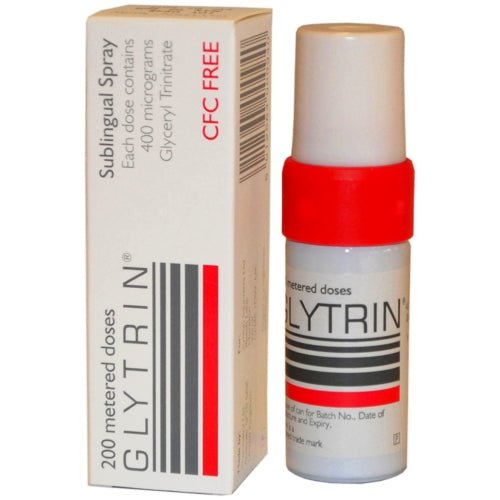Glytrin 400mcg Sublingual Spray - 200 Dose
Price:
£6.88 GBPGlytrin Sublingual Spray
Glytrin 400mcg Sublingual Spray is used to treat angina at the onset of an attack and can also be used to prevent angina which can be brought on from physical effort, emotional stress, and exposure to cold, etc.
Glytrin 400mcg Sublingual Spray contains the active ingredient glyceryl trinitrate, a nitrate that relaxes the muscle walls of the blood vessels and reduces the workload of the heart.
Directions:
- Glytrin is not recommended for children.
- Always use Glytrin exactly as explained in this leaflet. You should check with your doctor or pharmacist if you are not sure. Learn how to use Glytrin before the onset of an angina attack, as you may need to use it in a hurry, or in the dark. Familiarise yourself with the spray button, which has a finger rest to help you direct the spray.
- Keep a spare handy at all times as it can be difficult to tell how many doses are left in the canister.
- Do not use Glytrin if you are near a naked fl ame, e.g. a cigarette.
- Before using Glytrin for the first time, check that the spray is working by pressing the pump button a few times until it produces a fine mist of liquid.
- Practice aiming the spray onto a tissue or similar item so that you will be able to aim it correctly under the tongue when you need to use it. If you do not need to use Glytrin very often, remember to check the spray regularly to see that it still works properly.
- Sit down.
- Hold the canister upright and near your mouth.
- Hold your breath.
- Aim the spray under your tongue.
- Press down the button firmly, once only.
- Close your mouth immediately.
- Do not inhale the spray.
The usual dose is one or two sprays. No more than three doses are recommended at any one time. After using Glytrin, rest for a while. When you stand up, rise slowly, as you may feel faint.
Ingredients:
- Active Ingredient: Glyceryl trinitrate 400 micrograms per spray.
- Other Ingredients: Peppermint oil, ethanol and 1,1,1,2 tetrafl uoroethane (the propellant).
Cautions:
- Be careful about drinking alcohol as Glytrin may affect you more than usual. Both alcohol and Glytrin may lower your blood pressure and slow down your reactions.
- If you are, or think you might be pregnant, ask your doctor for advice before taking this medicine, Glytrin should not be used if you are breastfeeding.
- Your reactions may slow down. Therefore you should avoid driving and using machinery whilst taking Glytrin.
- Glytrin contains ethanol (alcohol), less than 100mg per spray.
- Continuous use of Glytrin and other nitrates may reduce effectiveness at relieving your symptoms, so high continuous doses should be avoided.
- If you are allergic to glyceryl trinitrate or any of the other ingredients of this medicine.
- If you have severe low blood pressure.
- If you have shock caused by low blood pressure.
- If you have severe anaemia.
- If you have constrictive pericarditis (a heart condition).
- If you have an extremely low heart rate.
- If you have glucose-6-phosphate-dehydrogenase deficiency (an inherited enzyme deficiency, mainly affecting men).
- If you have a brain trauma or cerebral haemorrhage (brain or head injury, including bleeding).
- If you have narrowing of the heart valves or arteries or angina caused by a disease of the heart muscle.
- If you have circulatory collapse (a failure of blood circulation).
- If you have toxic pulmonary oedema (lung swelling/ fluid)
- If you have cardiogenic shock (a serious heart condition caused by very low blood pressure, which may result in the following symptoms: dizziness and lightheadedness, fast pulse rate, white skin, sweating, restlessness or loss of consciousness).
- If you are taking any medication used to treat male erectile dysfunction (impotence).
- Fluid around the heart (pericardial tamponade).
- Low filling pressures (e.g. acute myocardial infarction).
- Problems controlling your blood pressure.
- Any disease that increases pressure on the brain.
- Glaucoma (a condition in which the pressure in the eye may be high).
- Liver or kidney problems.
- An underactive thyroid gland.
- Medicines treating blood pressure or heart problems, such as vasodilators, antihypertensives, betablockers and calcium channel blockers.
- Tricyclic anti-depressants or neuroleptics, used to treat mental health conditions.
- Diuretics (water tablets to increase amount of urine produced).
- Dihydroergotamine, used to treat migraine headaches.
- Blood thinners used to prevent blood clots. Your doctor will need to monitor you more closely.
- Organic nitrates (other acute angina treatments)
---
Free standard UK Delivery on all orders over £40

Glytrin 400mcg Sublingual Spray - 200 Dose
Price:
£6.88 GBP

